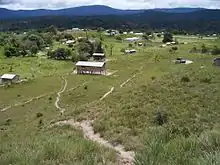Paramakatoi (sometimes spelled Paramakotoi) is a town in Potaro-siparuni in the Guyanese Highlands. This is an extremely remote area. Calling it a place to "get away" would be a great understatement — it is more like stepping back in time and witnessing subsistence living. Internet is reportedly available as of 2017. There are no restaurants and many people living here will have never seen an automobile. Walking is the main form of transportation, and residents think nothing of walking for two days through the rain forest to make it to a neighbouring location. People are friendly and everyone is expected to be greeted with a "good day, sir/miss".
Get in

The only practical way to get to Paramakatoi is to fly with Trans Guyana Airways. They leave from the Ogle (small city airport) in Georgetown. There are a few flights a week but the schedule varies according to the need. Be sure to carry a passport as it may be required before departure or upon return. During the dry season, there is a trail from Lethem that is sometimes usable. This trail is primarily used to bring in supplies. The distance may be short on a map, but the conditions of the trail make for about a two day drive without benefit of gas stations, hotels, or restaurants.
In October 2016, one traveller was told that the trail to Lethem is dangerous to drive, but safe to walk.
Get around
Walk, walk, walk. There are a couple of ATV's in the town, and they can be rented with a driver for short trips.
See



The surrounding rainforest is truly beautiful and unspoiled. Many buildings in town are built using traditional techniques of bark, mud and thatch construction.
Do
Walk on trails to some of the surrounding waterfalls. The local residents will be delighted to escort you for a few dollars. This is a wise thing to do as many of the trails cross over one another and can become quite confusing.
Buy
There are numerous shops which sell the basic necessities and even cheap Brazilian beer.
Eat
Pepper pot is a traditional meat dish, and cassava bread is a staple. Chicken and eggs can be purchased at anytime of the year but other fresh items will depend entirely on what is in season. At times during the year it is possible to get delicious items such as pineapple, mango, watermelon, paw-paw and banana. There are no restaurants, but it is possible to hire a cook.
Drink
Water is gotten from a spring or collected as rain water. This should be boiled before drinking. Bottled water is not readily available, so it would be wise to arrive with as much as possible. Alcohol is available (both rum and beer) along with several local fermented drinks such as parakari and cassiri (cassava beer).
Sleep
There is a guest house that has four bedrooms. It is impossible to contact the manager prior to arriving, but space is usually available. There is also a small bible college that may have space. Ask at the haberdashery, and space will be found.
Connect
For $15 (US) you can get wifi at Sherry Balkaran's store.
Go next
It is possible to walk to the neighbouring village of Kato. This is about a four hour walk. Hiring an ATV can cut the trip down to a little over an hour. Kato is located on a savannah and is a pleasant change from the rain forest of Paramakatoi. It is, however, small and just as remote as Paramakatoi.